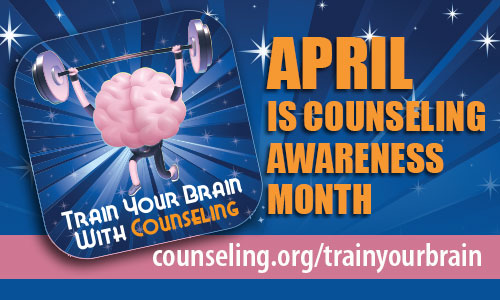Counseling Awareness Month: Myths and Facts of Counseling

Each April, the American Counseling Association (ACA) sponsors Counseling Awareness Month to encourage people to learn about professional counselors and the benefits of counseling. Many people are afraid to seek counseling, even though they could benefit from it. Some common misconceptions perpetuate the myth that counseling is scary. However, the following facts will demonstrate that counseling is for everyone and counselors are here to help.
Disclaimer: If you are in crisis, please call 911 or the National Suicide Prevention Lifeline at 1-800-273-8255.
MYTH: You have to have a mental illness to go to counseling.
FACT: It is true that some people who have severe mental illnesses work with counselors to manage symptoms, but counselors also help people work through everyday problems like relationship issues, sadness, grief, and career transitions.
MYTH: People will assume there is something wrong with you if you seek counseling.
FACT: It takes courage to call a counselor. Counselors help people work through many life circumstances, and they welcome all clients. Counselors hold a nonjudgmental space in which clients are encouraged to be open and honest about their situations so that counselors can gain a full understanding of what is going on and how they can best help.
MYTH: Men aren’t in touch with their feelings and will not benefit from counseling.
FACT: Both men and women can benefit from counseling. While it is true that women seek counseling more often than men, the amount of men seeking services has increased over the last 10 years, suggesting that men are becoming more open to counseling.1
MYTH: Seeking counseling is a sign of weakness.
FACT: Seeking counseling is a way to proactively manage your problems. If you have problems that impair your ability to function day to day, a counselor can teach you skills to handle difficult times. In addition, some people seek counseling services to improve their already great lives. Counseling can help people develop skills that will help them excel in specific areas such as sports, business, and leadership.
MYTH: Counselors will try to put you on medication.
FACT: Licensed counselors hold master’s or doctoral degrees in mental health fields. They provide appropriate counseling and do not prescribe medication. Counselors work with psychiatrists, who are medical doctors, when creating collaborative treatment plans for clients who do take medication. Psychiatrists prescribe medication to address biological aspects of managing mental health, and counselors work with clients to address the psychological aspects of mental health.
MYTH: Mental health issues are not real problems and counselors are not reputable doctors.
FACT: Mental health counselors hold advanced graduate degrees and study for years under the supervision of an experienced counselor. After graduating, counselors receive thousands of hours of supervised practice before becoming licensed and treating clients on their own. Mental health issues are real problems — one in five Americans suffers from mental health problems, and one in 10 minors has experienced depression. Counselors can address these problems and help clients find relief from issues that are weighing them down.
MYTH: Counseling is a quick fix for all your problems.
If you are in crisis, please call 911 or the National Suicide Prevention Lifeline at 1-800-273-8255.
FACT: There are no quick fixes when it comes to mental health. Strengthening your brain through counseling is like strengthening your body through exercise. It takes time, practice, patience, and persistence. Each person who enters counseling is a unique individual, so there is no universal formula to determine how long it will be before a client feels better. Making a commitment to yourself to enter counseling is a way to learn about yourself and your worldviews. In addition, you can learn ways to improve your decision-making process, which can result in more uplifting feelings on a regular basis. Counseling is an investment in yourself.
MYTH: If you go to counseling, everyone will know and judge you negatively.
FACT: Going into counseling shows that you are willing to learn about yourself and ways to improve your life. It takes strength to call a counselor to make an appointment. They do not judge their clients — counselors welcome you. Please know that counselors have heard a lot of life stories, and they hold each one with confidentiality and respect. Counselors want to decrease the stigma related to seeking counseling and to create a world where seeking counseling is as common as seeking relief from the common cold.
Please share this article with others and support Counseling@Northwestern’s goal of raising awareness about Counseling Awareness Month. Counseling can help with multiple areas of life, including parenting, breakups, grief, financial stress, wellness goals, work-life balance, and many more. There is a myth that only “crazy” people seek counseling, when the fact is that counselors do not use the word crazy and help people with all degrees of concern. The World Health Organization defines health not as the absence of illness, but as “a state of complete physical, mental, and social well-being.” Counselors can help you maintain or gain your own sense of health. To find a counselor, please contact The Family Institute at Northwestern University (in the Chicagoland area) or the American Counseling Association.
Resources
Reference
- Evans, Duffey and Englar-Carlson. “Introduction to the Special Issue: Men in Counseling,” Journal of Counseling & Development, Sept. 17, 2013. Volume 91, Issue 4, Pages 387-389. onlinelibrary.wiley.com/doi/10.1002/j.1556-6676.2013.00108.x/abstract

